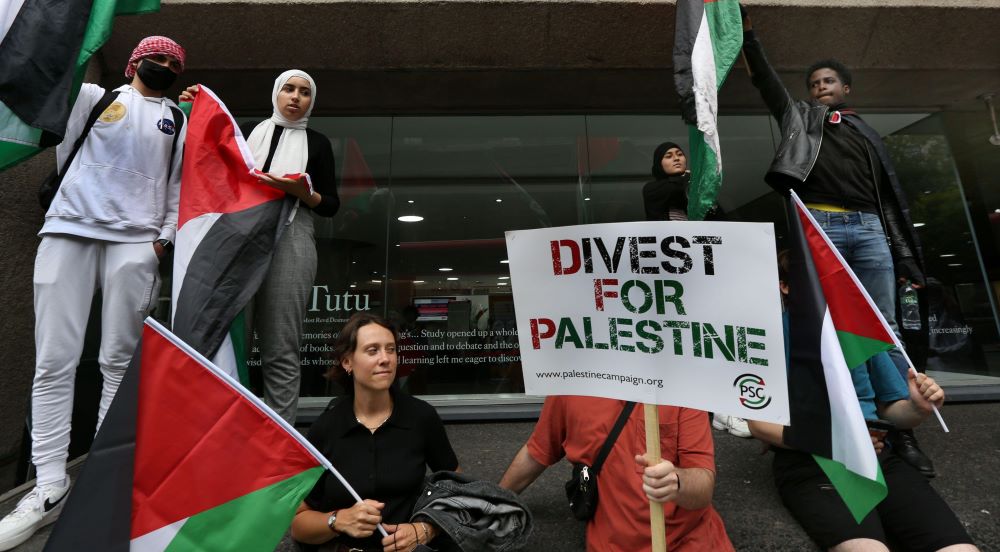Why The Government's Anti-Boycott Bill Is So Controversial
4 min read
The controversial Economic Activity of Public Bodies (Overseas Matters) bill, also dubbed 'the BDS bill', seeks to prevent public bodies engaging in political boycotts of foreign states.
The government argues the bill will help prevent attempts to "undermine community cohesion" and prevent public authorities being influced by "political or moral dispproval".
It is a response to the Palestinian-led Boycott, Divest and Sanction (BDS) movement against Israel and reports that some public bodies, like councils, were supporting the organisation.
Critics of BDS say its sole focus on boycotting Israel, the only Jewish state in the world, and use of language like "colonisation" and "genocide" to refer to its behaviour is antisemitic.
They also argue boycotts of Israeli goods largely affect Jews trying to access items like kosher food, and that actions like boycotting Israeli academics due to their nationality, is racist.
Head of policy and research at the Jewish Leadership Council, Russell Langer, writing in The Jewish Chronicle last month, said the way BDS is implemented is often "directly harmful to Jewish and Israeli people in the UK".
"Examples include a Sainsbury’s in Central London temporarily removing kosher products from their shelves and West Dunbartonshire Council having to row back on a policy of removing books by Israeli authors from libraries," said Langer.
In parliament on Monday, Levelling Up, Housing and Communities secretary Michael Gove said the bill will ensure local authorities do not direct resources "inefficiently", and that the legislation "provides protection for minority communities, especially the Jewish community, against campaigns that harm community cohesion and fuel antisemitism".
The bill passed backed by 268 votes to 70 votes.

Why it's controversial
A number of Palestinian human rights advocates argue BDS is a legitimate way to pressure Israel to end the occupation in Palestine, and to push for Palestinians to be able to return to properties in Israel they owned before 1948, when Israel was established.
The bill has also been criticised by human rights organisations – including Liberty and Greenpeace – and received a mixed reception from the UK Jewish community, Labour, and some Tory MPs.
Their core concerns are fears it infringes on the right to freedom of speech, and could affect public bodies' ability to oppose human rights abuses more broadly – including the genocide against Uyghur Muslims in China, and even Russia's invasion of Ukraine.
There are also concerns it could prevent public authorities from divesting pensions funds from countries that may be breaching human rights.
Yachad, a British Jewish pro-Israel and pro-Palestine peace organisation, has described the bill as "highly undemocratic and to all intents and purposes... a gagging order on public authorities".
"One does not have to be a supporter of boycotts of Israel or the occupied Palestinian territories to see that using legislation to clamp down on free speech and space for dissent harms our democracy," Hannah Weisfeld, director and a founder of the organisation, told PoliticsHome.
"The idea that the Jewish community is somehow safer because it will now be made illegal for public authorities not just to boycott Israel, but China or Myanmar, to name just a few examples, and furthermore will be barred from even saying that they would do so, were they allowed, is simply not true.
"Instead, it will position the Jewish community in opposition to a broad range of civil society organisations in the UK who are desperately concerned about the impact this legislation will have on a wide range of human rights issues. "
Weisfeld also said the legislation was a "gift" to the Israeli government, warning against the bill's conflation of Israel with the occupied Palestinian territories (OPT) and the occupied Golan Heights in the legislation.
"At a time when the most extreme government in Israel’s history is seeking to remove checks and balances on its power, and permanently annex the West Bank, this legislation seeks to create a situation in which Israel and the occupied Palestinian territories are treated as one and the same," said Weisfeld.
"It does nothing other than deliver a gift to the Israeli government, further entrenching their extremism and puts the occupation, that has denied the Palestinian people their basic rights for over 56 years, beyond public scrutiny."
Labour abstained on a vote on the bill after their amendment, which cited concerns the bill risks "significantly undermining support" for groups like Uyghur Muslims facing "grave and systemic human rights abuses", was defeated.
Shadow levelling up secretary Lisa Nandy told MPs while Labour "opposes BDS as a policy" it believes the government's approach is "deeply flawed and will not address the problem it rightly seeks to solve".
Tory MP and chair of the foreign affairs select committee, Alicia Kearns, also criticised the bill – telling MPs it "essentially gives exceptional impunity to Israel", and "undermines our commitments as a UN security council member".
